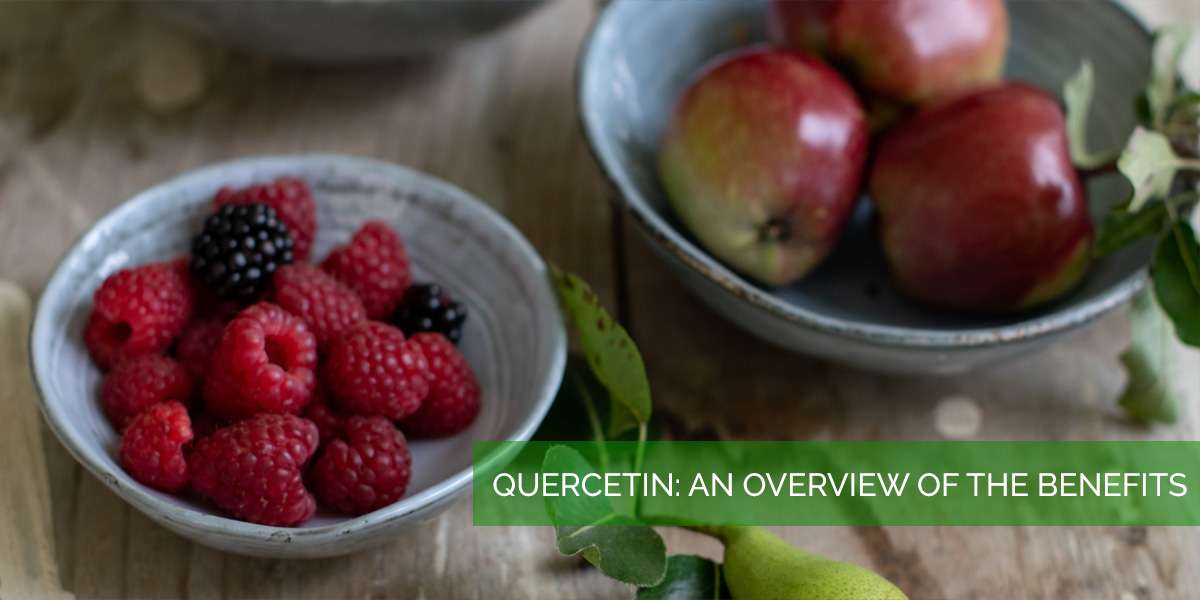Quercetin: An Overview of the Benefits

What is Quercetin?
Quercetin is a type of flavonoid, which is a class of plant compounds that are commonly found in fruits, vegetables, and other foods. These flavonoids are responsible for each cannabis strain’s unique flavors and the pigmentation of the plant. Quercetin is known for its antioxidant and anti-inflammatory properties, and has been studied for its potential health benefits in a number of areas, including heart health, cancer, and allergies.
Some preliminary studies have suggested that quercetin may have potential benefits for the treatment of chronic pain, although more research is needed in this area. Some researchers have proposed that the anti-inflammatory and antioxidant effects of quercetin may help to reduce pain and improve overall health.
Quercetin is widely available in supplement form, although it can also be found in foods such as red apples, red grapes, red onions, green tea, and blueberries.
How does Quercetin Work in Cannabis?
When it comes to cannabis, quercetin may play a role in modifying the effects of certain compounds found in the plant. Some studies have suggested that quercetin may interact with the endocannabinoid system, which is a system of receptors in the body that help to regulate a variety of functions, including pain, mood, and appetite. By interacting with the endocannabinoid system, quercetin may help to modulate the effects of certain cannabinoids, such as tetrahydrocannabinol (THC) and cannabidiol (CBD).
However, more research is needed to fully understand the role that quercetin plays in the effects of cannabis, and it is not clear how it may specifically impact the effects of THC or CBD. Additionally, there is currently limited scientific evidence to support the use of quercetin as a treatment for any specific medical condition, including those related to cannabis use.
What Are the Health Benefits and Uses of quercetin?
Quercetin has been studied for its potential health benefits, including:
- Anti-inflammatory effects: Quercetin has been shown to have anti-inflammatory effects in both in vitro and animal studies.
- Antioxidant effects: Quercetin has been shown to have potent antioxidant properties, which may help protect against oxidative stress and cellular damage.
- Cardiovascular health: The flavonoid may help improve cardiovascular health by reducing the risk of heart disease. It has been shown to have a positive effect on blood pressure and cholesterol levels.
- Allergic reactions: Quercetin has been shown to have anti-allergic properties and may be helpful in reducing symptoms of allergies, such as sneezing, itching, and runny nose.
- Cancer: Some studies have suggested that quercetin may have anti-cancer properties and may help reduce the risk of certain types of cancer, such as prostate cancer.
- Cognitive function: Quercetin has been shown to have a positive effect on cognitive function and may help protect against age-related cognitive decline.
It’s important to note that while these potential health benefits are promising, more research is needed to fully understand the effects of quercetin and to determine its safety and efficacy in humans.
Who Should Avoid Quercetin
Quercetin is generally considered safe for most people, but there are some individuals who should avoid taking it. These include:
- Pregnant and breastfeeding women: There is not enough research on the safety of quercetin during pregnancy and breastfeeding, so it is best to avoid it.
- People taking blood-thinning medications: Quercetin can interact with blood-thinning medications such as warfarin, causing an increased risk of bleeding.
- People with allergies to plants: Quercetin is found in many fruits and vegetables, and individuals who are allergic to plants may also be allergic to quercetin.
- People with kidney or liver disease: Quercetin is metabolized by the liver and eliminated by the kidneys, so individuals with kidney or liver disease may need to avoid it.
- People taking certain medications: Quercetin can interact with some medications, including certain antibiotics, anti-inflammatory drugs, and antidepressants, so it is important to discuss with your doctor if you are taking any medications before taking quercetin.
It is important to note that the information presented here is not a substitute for professional medical advice. Before taking quercetin, it is best to speak with a doctor or healthcare provider to determine if it is safe and appropriate for you.
LEARN MORE
Curious to learn more about medical cannabis or to start your medical marijuana treatment? Give the qualified team at Affordable Marijuana Clinic a call at (904) 586-0041 or submit a short application today!
JOIN OUR GROWING COMMUNITY
To stay up-to-date with the latest studies and legal regulations surrounding medical marijuana treatment, be sure to follow Affordable Marijuana License on Facebook and sign up for our newsletter, below!


